Wider Professional Practice and Development in Education and Training
VerifiedAdded on 2023/06/10
|13
|4065
|368
AI Summary
This report discusses the concept of professionalism and dual professionalism in education and training, the impact of accountability to stakeholders and external bodies, and current educational policies on curriculum and practice. It also covers the importance of collaboration with employers and other stakeholders in education and training, and the role of quality improvement and assurance in organizations.
Contribute Materials
Your contribution can guide someone’s learning journey. Share your
documents today.
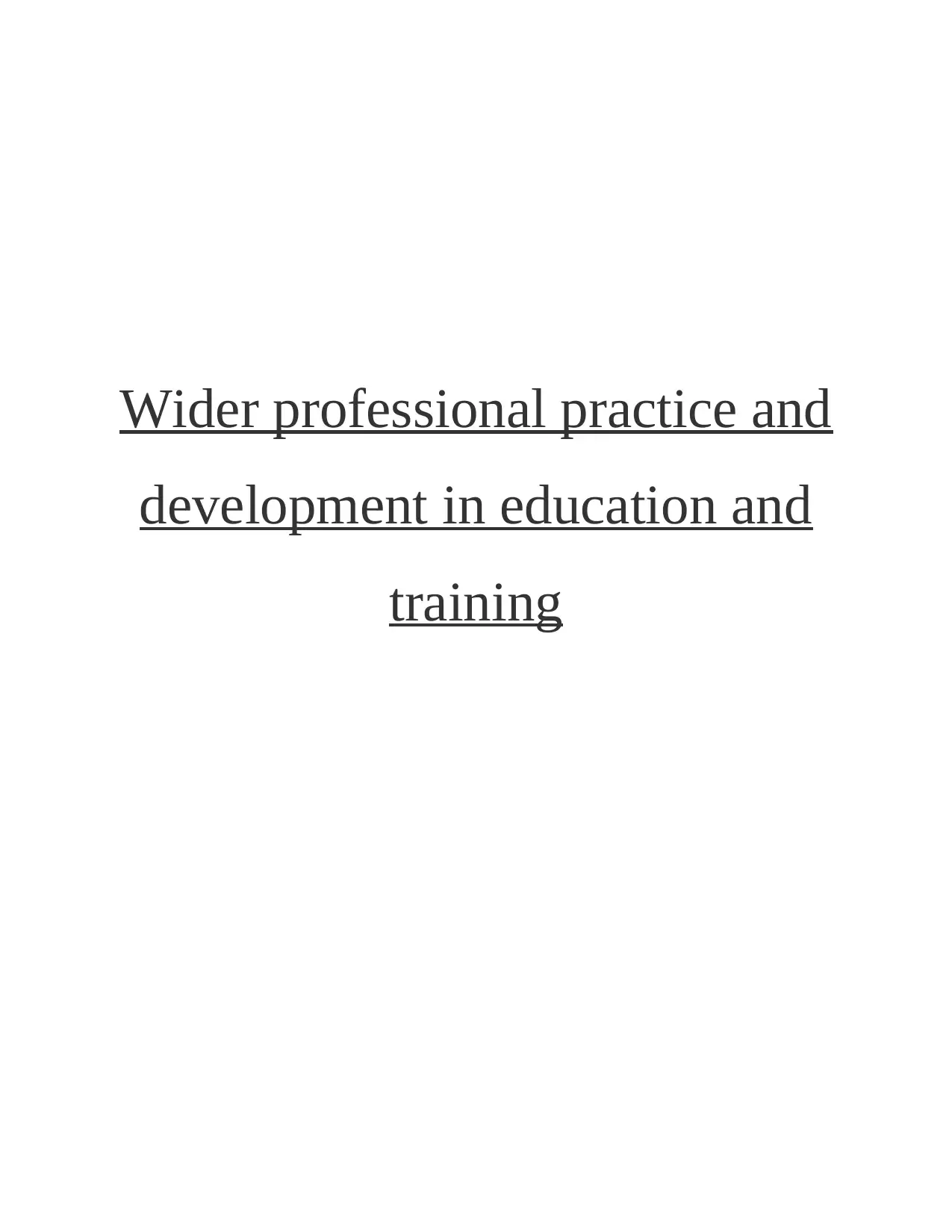
Wider professional practice and
development in education and
training
development in education and
training
Secure Best Marks with AI Grader
Need help grading? Try our AI Grader for instant feedback on your assignments.
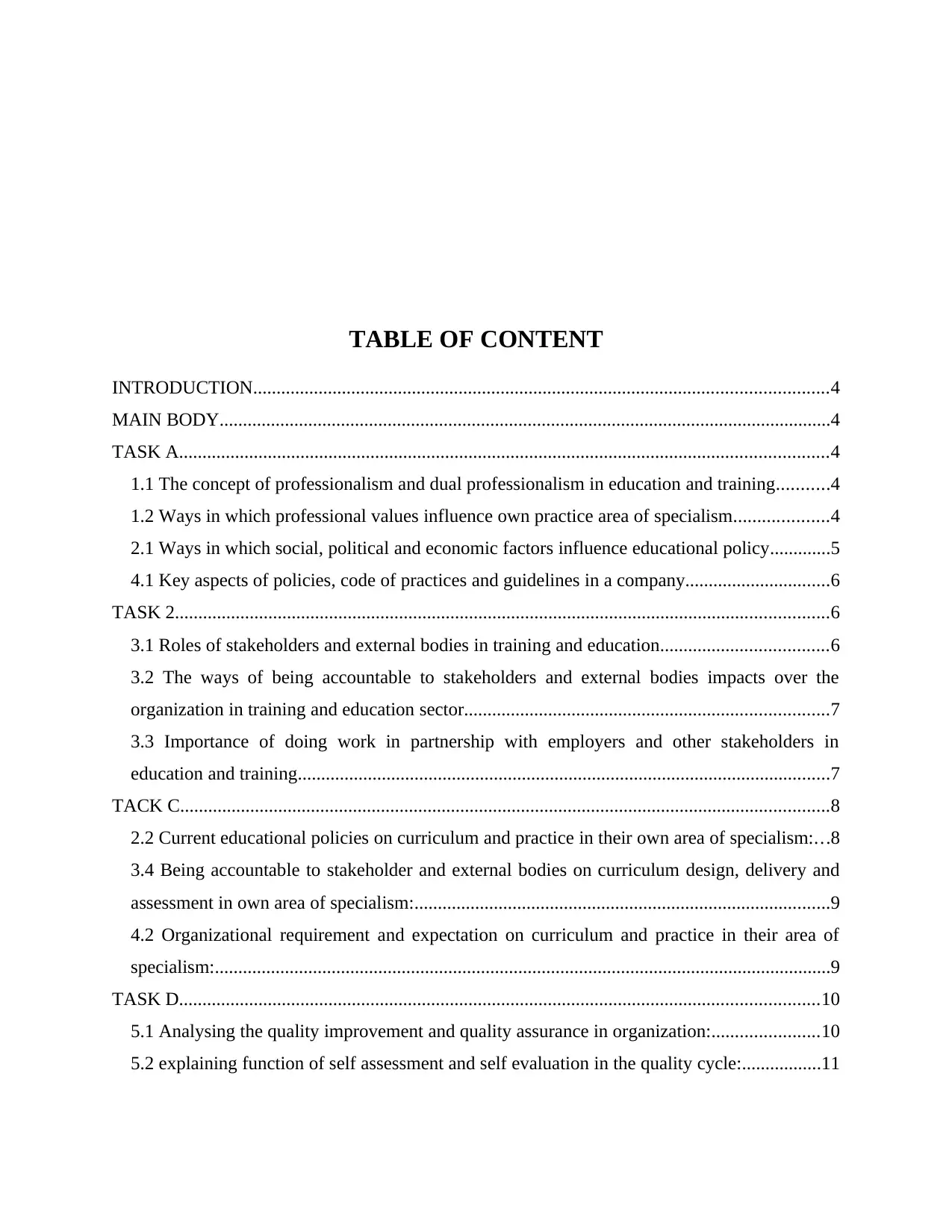
TABLE OF CONTENT
INTRODUCTION...........................................................................................................................4
MAIN BODY...................................................................................................................................4
TASK A...........................................................................................................................................4
1.1 The concept of professionalism and dual professionalism in education and training...........4
1.2 Ways in which professional values influence own practice area of specialism....................4
2.1 Ways in which social, political and economic factors influence educational policy.............5
4.1 Key aspects of policies, code of practices and guidelines in a company...............................6
TASK 2............................................................................................................................................6
3.1 Roles of stakeholders and external bodies in training and education....................................6
3.2 The ways of being accountable to stakeholders and external bodies impacts over the
organization in training and education sector..............................................................................7
3.3 Importance of doing work in partnership with employers and other stakeholders in
education and training..................................................................................................................7
TACK C...........................................................................................................................................8
2.2 Current educational policies on curriculum and practice in their own area of specialism:...8
3.4 Being accountable to stakeholder and external bodies on curriculum design, delivery and
assessment in own area of specialism:.........................................................................................9
4.2 Organizational requirement and expectation on curriculum and practice in their area of
specialism:....................................................................................................................................9
TASK D.........................................................................................................................................10
5.1 Analysing the quality improvement and quality assurance in organization:.......................10
5.2 explaining function of self assessment and self evaluation in the quality cycle:.................11
INTRODUCTION...........................................................................................................................4
MAIN BODY...................................................................................................................................4
TASK A...........................................................................................................................................4
1.1 The concept of professionalism and dual professionalism in education and training...........4
1.2 Ways in which professional values influence own practice area of specialism....................4
2.1 Ways in which social, political and economic factors influence educational policy.............5
4.1 Key aspects of policies, code of practices and guidelines in a company...............................6
TASK 2............................................................................................................................................6
3.1 Roles of stakeholders and external bodies in training and education....................................6
3.2 The ways of being accountable to stakeholders and external bodies impacts over the
organization in training and education sector..............................................................................7
3.3 Importance of doing work in partnership with employers and other stakeholders in
education and training..................................................................................................................7
TACK C...........................................................................................................................................8
2.2 Current educational policies on curriculum and practice in their own area of specialism:...8
3.4 Being accountable to stakeholder and external bodies on curriculum design, delivery and
assessment in own area of specialism:.........................................................................................9
4.2 Organizational requirement and expectation on curriculum and practice in their area of
specialism:....................................................................................................................................9
TASK D.........................................................................................................................................10
5.1 Analysing the quality improvement and quality assurance in organization:.......................10
5.2 explaining function of self assessment and self evaluation in the quality cycle:.................11
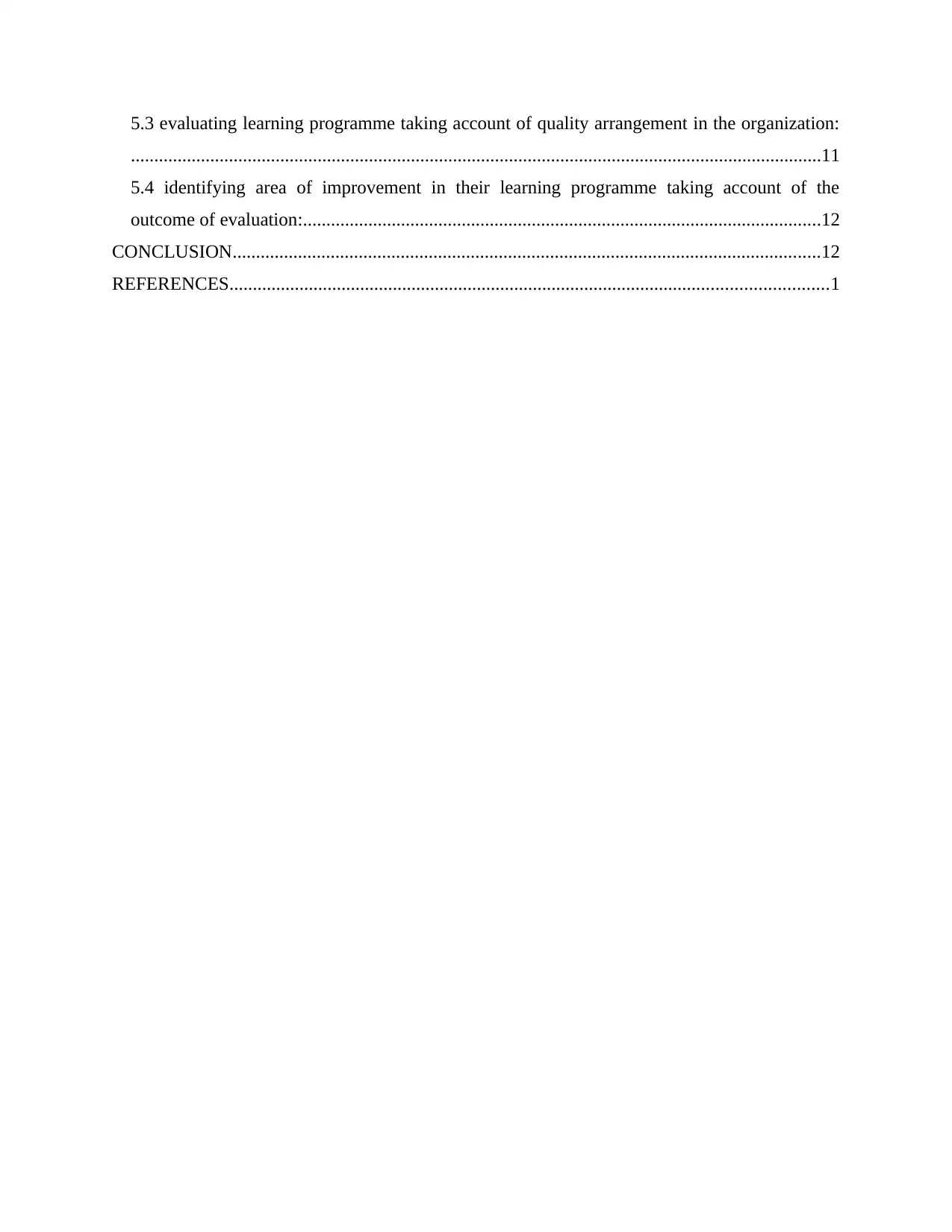
5.3 evaluating learning programme taking account of quality arrangement in the organization:
....................................................................................................................................................11
5.4 identifying area of improvement in their learning programme taking account of the
outcome of evaluation:...............................................................................................................12
CONCLUSION..............................................................................................................................12
REFERENCES................................................................................................................................1
....................................................................................................................................................11
5.4 identifying area of improvement in their learning programme taking account of the
outcome of evaluation:...............................................................................................................12
CONCLUSION..............................................................................................................................12
REFERENCES................................................................................................................................1
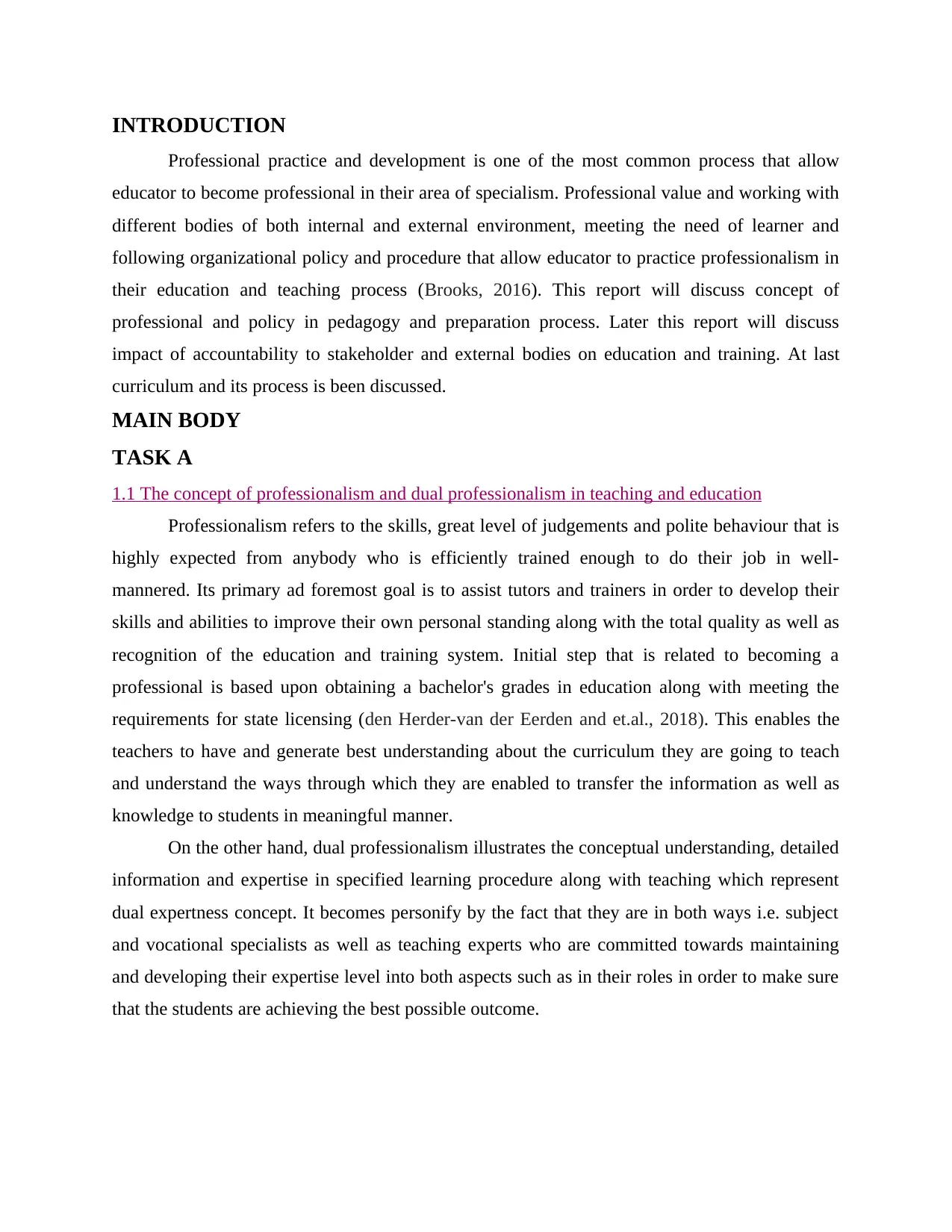
INTRODUCTION
Professional practice and development is one of the most common process that allow
educator to become professional in their area of specialism. Professional value and working with
different bodies of both internal and external environment, meeting the need of learner and
following organizational policy and procedure that allow educator to practice professionalism in
their education and teaching process (Brooks, 2016). This report will discuss concept of
professional and policy in pedagogy and preparation process. Later this report will discuss
impact of accountability to stakeholder and external bodies on education and training. At last
curriculum and its process is been discussed.
MAIN BODY
TASK A
1.1 The concept of professionalism and dual professionalism in teaching and education
Professionalism refers to the skills, great level of judgements and polite behaviour that is
highly expected from anybody who is efficiently trained enough to do their job in well-
mannered. Its primary ad foremost goal is to assist tutors and trainers in order to develop their
skills and abilities to improve their own personal standing along with the total quality as well as
recognition of the education and training system. Initial step that is related to becoming a
professional is based upon obtaining a bachelor's grades in education along with meeting the
requirements for state licensing (den Herder-van der Eerden and et.al., 2018). This enables the
teachers to have and generate best understanding about the curriculum they are going to teach
and understand the ways through which they are enabled to transfer the information as well as
knowledge to students in meaningful manner.
On the other hand, dual professionalism illustrates the conceptual understanding, detailed
information and expertise in specified learning procedure along with teaching which represent
dual expertness concept. It becomes personify by the fact that they are in both ways i.e. subject
and vocational specialists as well as teaching experts who are committed towards maintaining
and developing their expertise level into both aspects such as in their roles in order to make sure
that the students are achieving the best possible outcome.
Professional practice and development is one of the most common process that allow
educator to become professional in their area of specialism. Professional value and working with
different bodies of both internal and external environment, meeting the need of learner and
following organizational policy and procedure that allow educator to practice professionalism in
their education and teaching process (Brooks, 2016). This report will discuss concept of
professional and policy in pedagogy and preparation process. Later this report will discuss
impact of accountability to stakeholder and external bodies on education and training. At last
curriculum and its process is been discussed.
MAIN BODY
TASK A
1.1 The concept of professionalism and dual professionalism in teaching and education
Professionalism refers to the skills, great level of judgements and polite behaviour that is
highly expected from anybody who is efficiently trained enough to do their job in well-
mannered. Its primary ad foremost goal is to assist tutors and trainers in order to develop their
skills and abilities to improve their own personal standing along with the total quality as well as
recognition of the education and training system. Initial step that is related to becoming a
professional is based upon obtaining a bachelor's grades in education along with meeting the
requirements for state licensing (den Herder-van der Eerden and et.al., 2018). This enables the
teachers to have and generate best understanding about the curriculum they are going to teach
and understand the ways through which they are enabled to transfer the information as well as
knowledge to students in meaningful manner.
On the other hand, dual professionalism illustrates the conceptual understanding, detailed
information and expertise in specified learning procedure along with teaching which represent
dual expertness concept. It becomes personify by the fact that they are in both ways i.e. subject
and vocational specialists as well as teaching experts who are committed towards maintaining
and developing their expertise level into both aspects such as in their roles in order to make sure
that the students are achieving the best possible outcome.
Secure Best Marks with AI Grader
Need help grading? Try our AI Grader for instant feedback on your assignments.
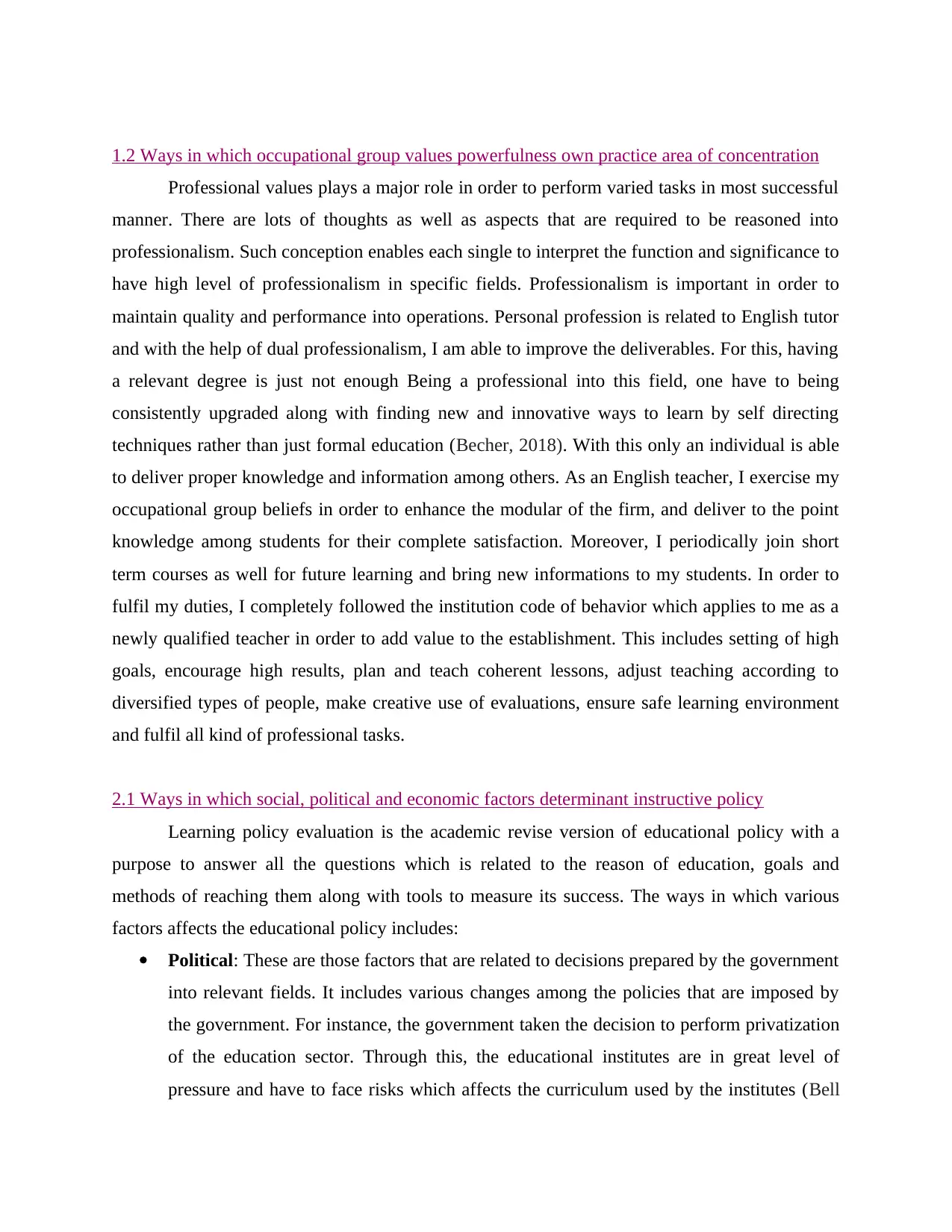
1.2 Ways in which occupational group values powerfulness own practice area of concentration
Professional values plays a major role in order to perform varied tasks in most successful
manner. There are lots of thoughts as well as aspects that are required to be reasoned into
professionalism. Such conception enables each single to interpret the function and significance to
have high level of professionalism in specific fields. Professionalism is important in order to
maintain quality and performance into operations. Personal profession is related to English tutor
and with the help of dual professionalism, I am able to improve the deliverables. For this, having
a relevant degree is just not enough Being a professional into this field, one have to being
consistently upgraded along with finding new and innovative ways to learn by self directing
techniques rather than just formal education (Becher, 2018). With this only an individual is able
to deliver proper knowledge and information among others. As an English teacher, I exercise my
occupational group beliefs in order to enhance the modular of the firm, and deliver to the point
knowledge among students for their complete satisfaction. Moreover, I periodically join short
term courses as well for future learning and bring new informations to my students. In order to
fulfil my duties, I completely followed the institution code of behavior which applies to me as a
newly qualified teacher in order to add value to the establishment. This includes setting of high
goals, encourage high results, plan and teach coherent lessons, adjust teaching according to
diversified types of people, make creative use of evaluations, ensure safe learning environment
and fulfil all kind of professional tasks.
2.1 Ways in which social, political and economic factors determinant instructive policy
Learning policy evaluation is the academic revise version of educational policy with a
purpose to answer all the questions which is related to the reason of education, goals and
methods of reaching them along with tools to measure its success. The ways in which various
factors affects the educational policy includes:
Political: These are those factors that are related to decisions prepared by the government
into relevant fields. It includes various changes among the policies that are imposed by
the government. For instance, the government taken the decision to perform privatization
of the education sector. Through this, the educational institutes are in great level of
pressure and have to face risks which affects the curriculum used by the institutes (Bell
Professional values plays a major role in order to perform varied tasks in most successful
manner. There are lots of thoughts as well as aspects that are required to be reasoned into
professionalism. Such conception enables each single to interpret the function and significance to
have high level of professionalism in specific fields. Professionalism is important in order to
maintain quality and performance into operations. Personal profession is related to English tutor
and with the help of dual professionalism, I am able to improve the deliverables. For this, having
a relevant degree is just not enough Being a professional into this field, one have to being
consistently upgraded along with finding new and innovative ways to learn by self directing
techniques rather than just formal education (Becher, 2018). With this only an individual is able
to deliver proper knowledge and information among others. As an English teacher, I exercise my
occupational group beliefs in order to enhance the modular of the firm, and deliver to the point
knowledge among students for their complete satisfaction. Moreover, I periodically join short
term courses as well for future learning and bring new informations to my students. In order to
fulfil my duties, I completely followed the institution code of behavior which applies to me as a
newly qualified teacher in order to add value to the establishment. This includes setting of high
goals, encourage high results, plan and teach coherent lessons, adjust teaching according to
diversified types of people, make creative use of evaluations, ensure safe learning environment
and fulfil all kind of professional tasks.
2.1 Ways in which social, political and economic factors determinant instructive policy
Learning policy evaluation is the academic revise version of educational policy with a
purpose to answer all the questions which is related to the reason of education, goals and
methods of reaching them along with tools to measure its success. The ways in which various
factors affects the educational policy includes:
Political: These are those factors that are related to decisions prepared by the government
into relevant fields. It includes various changes among the policies that are imposed by
the government. For instance, the government taken the decision to perform privatization
of the education sector. Through this, the educational institutes are in great level of
pressure and have to face risks which affects the curriculum used by the institutes (Bell
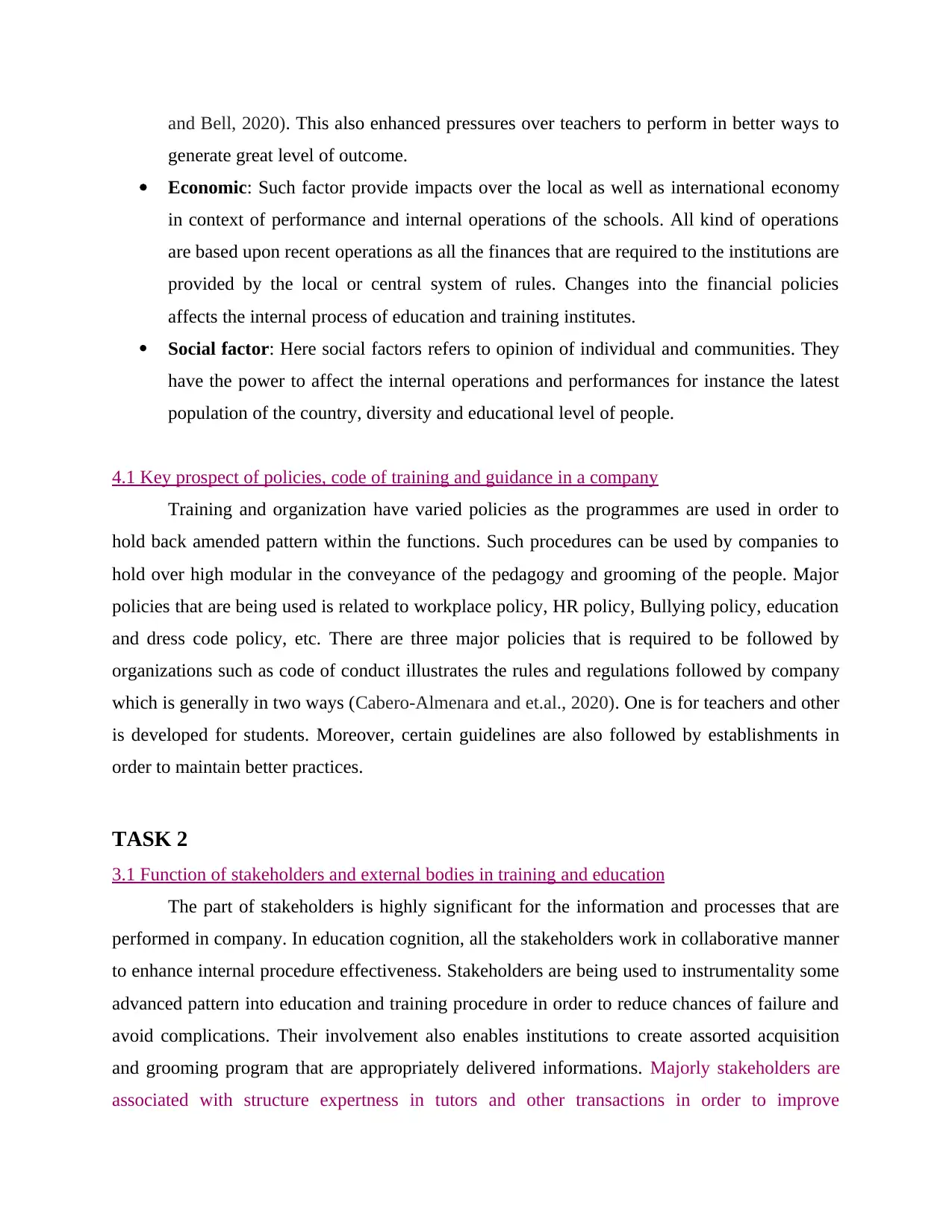
and Bell, 2020). This also enhanced pressures over teachers to perform in better ways to
generate great level of outcome.
Economic: Such factor provide impacts over the local as well as international economy
in context of performance and internal operations of the schools. All kind of operations
are based upon recent operations as all the finances that are required to the institutions are
provided by the local or central system of rules. Changes into the financial policies
affects the internal process of education and training institutes.
Social factor: Here social factors refers to opinion of individual and communities. They
have the power to affect the internal operations and performances for instance the latest
population of the country, diversity and educational level of people.
4.1 Key prospect of policies, code of training and guidance in a company
Training and organization have varied policies as the programmes are used in order to
hold back amended pattern within the functions. Such procedures can be used by companies to
hold over high modular in the conveyance of the pedagogy and grooming of the people. Major
policies that are being used is related to workplace policy, HR policy, Bullying policy, education
and dress code policy, etc. There are three major policies that is required to be followed by
organizations such as code of conduct illustrates the rules and regulations followed by company
which is generally in two ways (Cabero-Almenara and et.al., 2020). One is for teachers and other
is developed for students. Moreover, certain guidelines are also followed by establishments in
order to maintain better practices.
TASK 2
3.1 Function of stakeholders and external bodies in training and education
The part of stakeholders is highly significant for the information and processes that are
performed in company. In education cognition, all the stakeholders work in collaborative manner
to enhance internal procedure effectiveness. Stakeholders are being used to instrumentality some
advanced pattern into education and training procedure in order to reduce chances of failure and
avoid complications. Their involvement also enables institutions to create assorted acquisition
and grooming program that are appropriately delivered informations. Majorly stakeholders are
associated with structure expertness in tutors and other transactions in order to improve
generate great level of outcome.
Economic: Such factor provide impacts over the local as well as international economy
in context of performance and internal operations of the schools. All kind of operations
are based upon recent operations as all the finances that are required to the institutions are
provided by the local or central system of rules. Changes into the financial policies
affects the internal process of education and training institutes.
Social factor: Here social factors refers to opinion of individual and communities. They
have the power to affect the internal operations and performances for instance the latest
population of the country, diversity and educational level of people.
4.1 Key prospect of policies, code of training and guidance in a company
Training and organization have varied policies as the programmes are used in order to
hold back amended pattern within the functions. Such procedures can be used by companies to
hold over high modular in the conveyance of the pedagogy and grooming of the people. Major
policies that are being used is related to workplace policy, HR policy, Bullying policy, education
and dress code policy, etc. There are three major policies that is required to be followed by
organizations such as code of conduct illustrates the rules and regulations followed by company
which is generally in two ways (Cabero-Almenara and et.al., 2020). One is for teachers and other
is developed for students. Moreover, certain guidelines are also followed by establishments in
order to maintain better practices.
TASK 2
3.1 Function of stakeholders and external bodies in training and education
The part of stakeholders is highly significant for the information and processes that are
performed in company. In education cognition, all the stakeholders work in collaborative manner
to enhance internal procedure effectiveness. Stakeholders are being used to instrumentality some
advanced pattern into education and training procedure in order to reduce chances of failure and
avoid complications. Their involvement also enables institutions to create assorted acquisition
and grooming program that are appropriately delivered informations. Majorly stakeholders are
associated with structure expertness in tutors and other transactions in order to improve
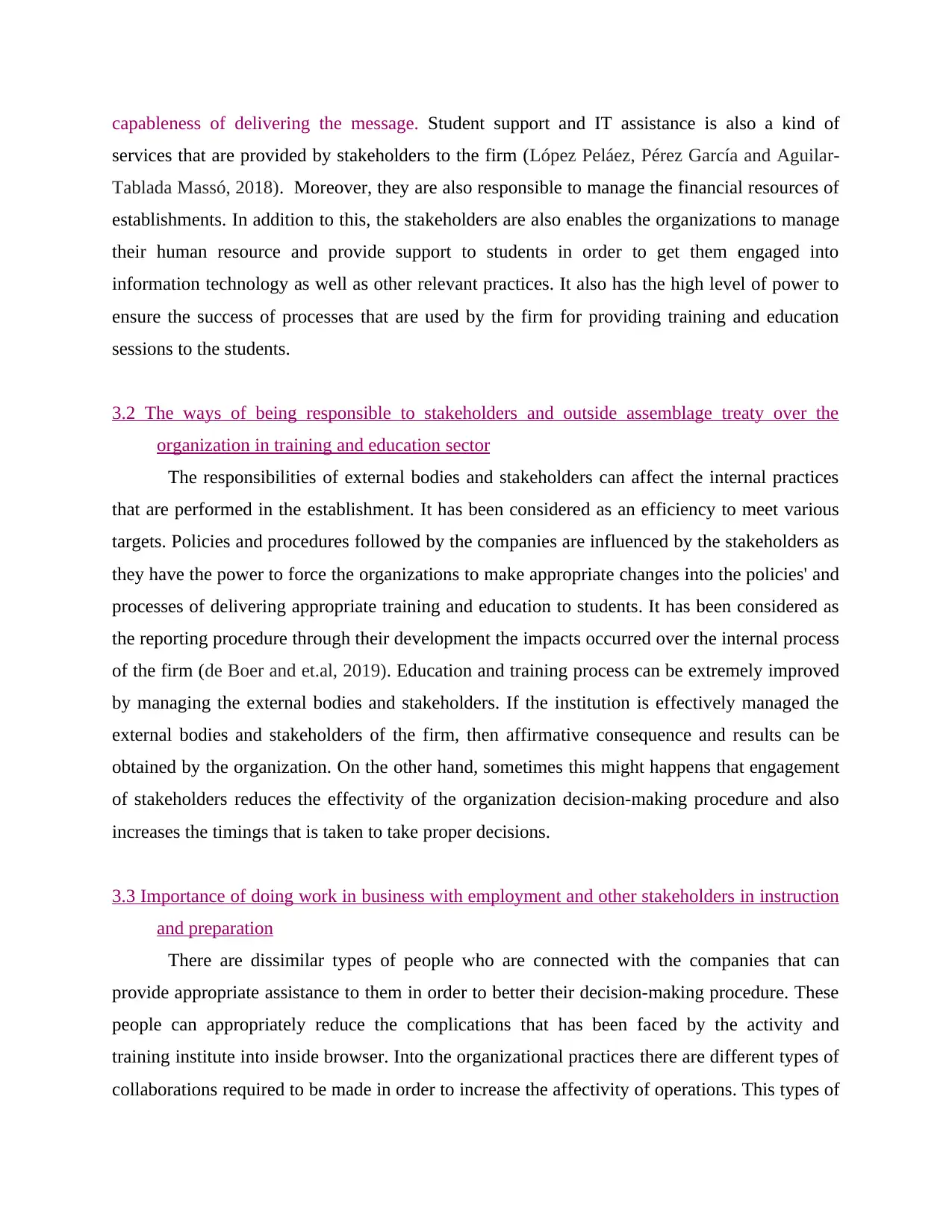
capableness of delivering the message. Student support and IT assistance is also a kind of
services that are provided by stakeholders to the firm (López Peláez, Pérez García and Aguilar-
Tablada Massó, 2018). Moreover, they are also responsible to manage the financial resources of
establishments. In addition to this, the stakeholders are also enables the organizations to manage
their human resource and provide support to students in order to get them engaged into
information technology as well as other relevant practices. It also has the high level of power to
ensure the success of processes that are used by the firm for providing training and education
sessions to the students.
3.2 The ways of being responsible to stakeholders and outside assemblage treaty over the
organization in training and education sector
The responsibilities of external bodies and stakeholders can affect the internal practices
that are performed in the establishment. It has been considered as an efficiency to meet various
targets. Policies and procedures followed by the companies are influenced by the stakeholders as
they have the power to force the organizations to make appropriate changes into the policies' and
processes of delivering appropriate training and education to students. It has been considered as
the reporting procedure through their development the impacts occurred over the internal process
of the firm (de Boer and et.al, 2019). Education and training process can be extremely improved
by managing the external bodies and stakeholders. If the institution is effectively managed the
external bodies and stakeholders of the firm, then affirmative consequence and results can be
obtained by the organization. On the other hand, sometimes this might happens that engagement
of stakeholders reduces the effectivity of the organization decision-making procedure and also
increases the timings that is taken to take proper decisions.
3.3 Importance of doing work in business with employment and other stakeholders in instruction
and preparation
There are dissimilar types of people who are connected with the companies that can
provide appropriate assistance to them in order to better their decision-making procedure. These
people can appropriately reduce the complications that has been faced by the activity and
training institute into inside browser. Into the organizational practices there are different types of
collaborations required to be made in order to increase the affectivity of operations. This types of
services that are provided by stakeholders to the firm (López Peláez, Pérez García and Aguilar-
Tablada Massó, 2018). Moreover, they are also responsible to manage the financial resources of
establishments. In addition to this, the stakeholders are also enables the organizations to manage
their human resource and provide support to students in order to get them engaged into
information technology as well as other relevant practices. It also has the high level of power to
ensure the success of processes that are used by the firm for providing training and education
sessions to the students.
3.2 The ways of being responsible to stakeholders and outside assemblage treaty over the
organization in training and education sector
The responsibilities of external bodies and stakeholders can affect the internal practices
that are performed in the establishment. It has been considered as an efficiency to meet various
targets. Policies and procedures followed by the companies are influenced by the stakeholders as
they have the power to force the organizations to make appropriate changes into the policies' and
processes of delivering appropriate training and education to students. It has been considered as
the reporting procedure through their development the impacts occurred over the internal process
of the firm (de Boer and et.al, 2019). Education and training process can be extremely improved
by managing the external bodies and stakeholders. If the institution is effectively managed the
external bodies and stakeholders of the firm, then affirmative consequence and results can be
obtained by the organization. On the other hand, sometimes this might happens that engagement
of stakeholders reduces the effectivity of the organization decision-making procedure and also
increases the timings that is taken to take proper decisions.
3.3 Importance of doing work in business with employment and other stakeholders in instruction
and preparation
There are dissimilar types of people who are connected with the companies that can
provide appropriate assistance to them in order to better their decision-making procedure. These
people can appropriately reduce the complications that has been faced by the activity and
training institute into inside browser. Into the organizational practices there are different types of
collaborations required to be made in order to increase the affectivity of operations. This types of
Paraphrase This Document
Need a fresh take? Get an instant paraphrase of this document with our AI Paraphraser
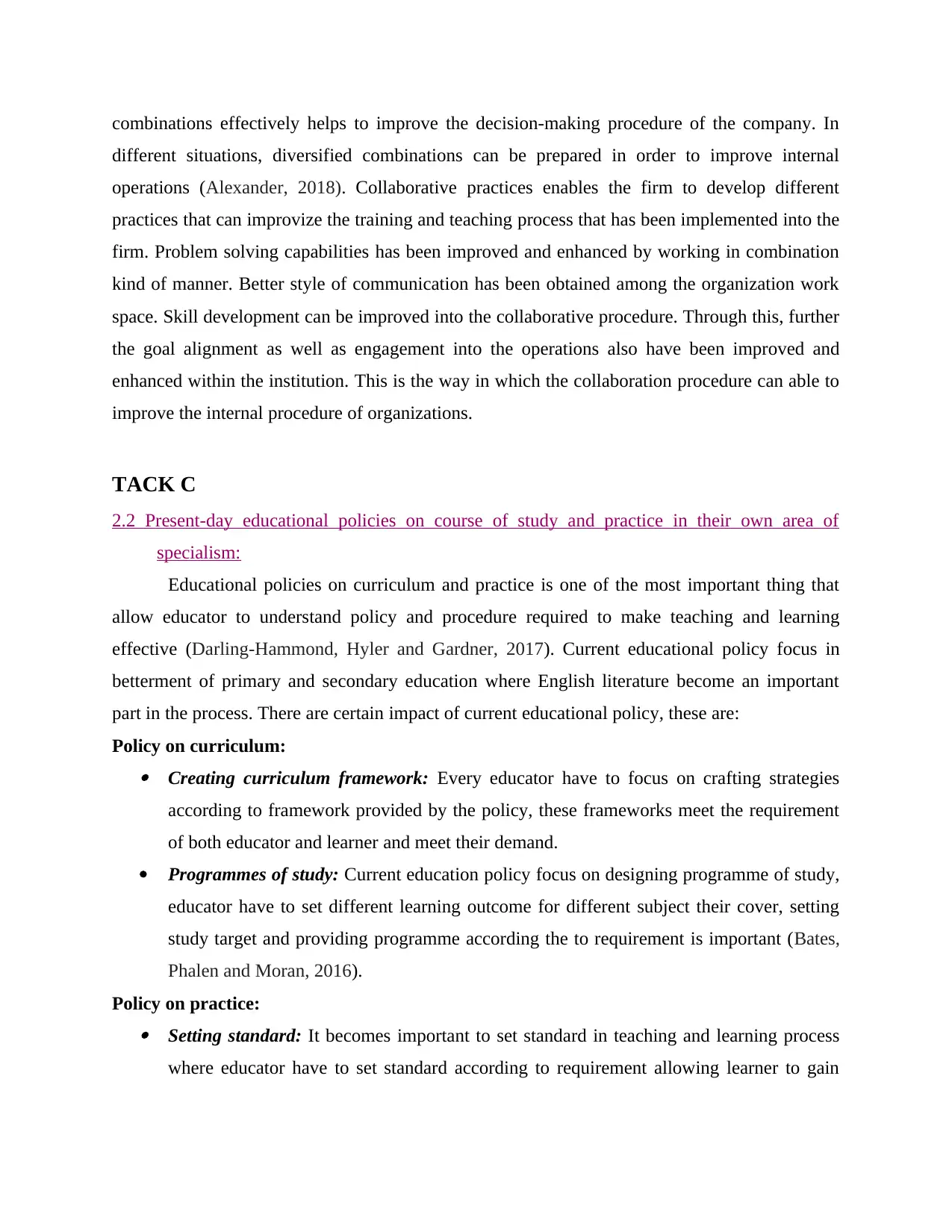
combinations effectively helps to improve the decision-making procedure of the company. In
different situations, diversified combinations can be prepared in order to improve internal
operations (Alexander, 2018). Collaborative practices enables the firm to develop different
practices that can improvize the training and teaching process that has been implemented into the
firm. Problem solving capabilities has been improved and enhanced by working in combination
kind of manner. Better style of communication has been obtained among the organization work
space. Skill development can be improved into the collaborative procedure. Through this, further
the goal alignment as well as engagement into the operations also have been improved and
enhanced within the institution. This is the way in which the collaboration procedure can able to
improve the internal procedure of organizations.
TACK C
2.2 Present-day educational policies on course of study and practice in their own area of
specialism:
Educational policies on curriculum and practice is one of the most important thing that
allow educator to understand policy and procedure required to make teaching and learning
effective (Darling-Hammond, Hyler and Gardner, 2017). Current educational policy focus in
betterment of primary and secondary education where English literature become an important
part in the process. There are certain impact of current educational policy, these are:
Policy on curriculum: Creating curriculum framework: Every educator have to focus on crafting strategies
according to framework provided by the policy, these frameworks meet the requirement
of both educator and learner and meet their demand.
Programmes of study: Current education policy focus on designing programme of study,
educator have to set different learning outcome for different subject their cover, setting
study target and providing programme according the to requirement is important (Bates,
Phalen and Moran, 2016).
Policy on practice: Setting standard: It becomes important to set standard in teaching and learning process
where educator have to set standard according to requirement allowing learner to gain
different situations, diversified combinations can be prepared in order to improve internal
operations (Alexander, 2018). Collaborative practices enables the firm to develop different
practices that can improvize the training and teaching process that has been implemented into the
firm. Problem solving capabilities has been improved and enhanced by working in combination
kind of manner. Better style of communication has been obtained among the organization work
space. Skill development can be improved into the collaborative procedure. Through this, further
the goal alignment as well as engagement into the operations also have been improved and
enhanced within the institution. This is the way in which the collaboration procedure can able to
improve the internal procedure of organizations.
TACK C
2.2 Present-day educational policies on course of study and practice in their own area of
specialism:
Educational policies on curriculum and practice is one of the most important thing that
allow educator to understand policy and procedure required to make teaching and learning
effective (Darling-Hammond, Hyler and Gardner, 2017). Current educational policy focus in
betterment of primary and secondary education where English literature become an important
part in the process. There are certain impact of current educational policy, these are:
Policy on curriculum: Creating curriculum framework: Every educator have to focus on crafting strategies
according to framework provided by the policy, these frameworks meet the requirement
of both educator and learner and meet their demand.
Programmes of study: Current education policy focus on designing programme of study,
educator have to set different learning outcome for different subject their cover, setting
study target and providing programme according the to requirement is important (Bates,
Phalen and Moran, 2016).
Policy on practice: Setting standard: It becomes important to set standard in teaching and learning process
where educator have to set standard according to requirement allowing learner to gain
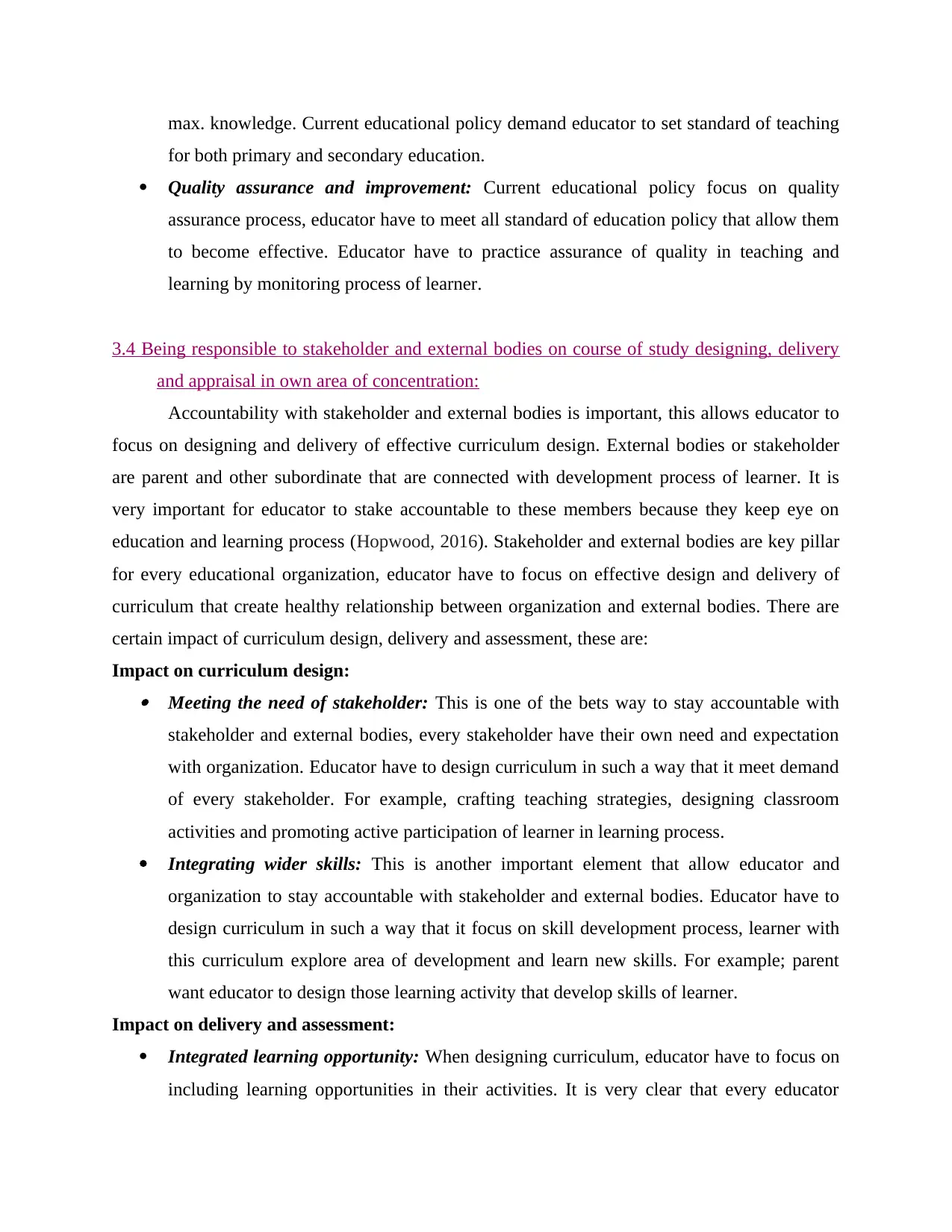
max. knowledge. Current educational policy demand educator to set standard of teaching
for both primary and secondary education.
Quality assurance and improvement: Current educational policy focus on quality
assurance process, educator have to meet all standard of education policy that allow them
to become effective. Educator have to practice assurance of quality in teaching and
learning by monitoring process of learner.
3.4 Being responsible to stakeholder and external bodies on course of study designing, delivery
and appraisal in own area of concentration:
Accountability with stakeholder and external bodies is important, this allows educator to
focus on designing and delivery of effective curriculum design. External bodies or stakeholder
are parent and other subordinate that are connected with development process of learner. It is
very important for educator to stake accountable to these members because they keep eye on
education and learning process (Hopwood, 2016). Stakeholder and external bodies are key pillar
for every educational organization, educator have to focus on effective design and delivery of
curriculum that create healthy relationship between organization and external bodies. There are
certain impact of curriculum design, delivery and assessment, these are:
Impact on curriculum design: Meeting the need of stakeholder: This is one of the bets way to stay accountable with
stakeholder and external bodies, every stakeholder have their own need and expectation
with organization. Educator have to design curriculum in such a way that it meet demand
of every stakeholder. For example, crafting teaching strategies, designing classroom
activities and promoting active participation of learner in learning process.
Integrating wider skills: This is another important element that allow educator and
organization to stay accountable with stakeholder and external bodies. Educator have to
design curriculum in such a way that it focus on skill development process, learner with
this curriculum explore area of development and learn new skills. For example; parent
want educator to design those learning activity that develop skills of learner.
Impact on delivery and assessment:
Integrated learning opportunity: When designing curriculum, educator have to focus on
including learning opportunities in their activities. It is very clear that every educator
for both primary and secondary education.
Quality assurance and improvement: Current educational policy focus on quality
assurance process, educator have to meet all standard of education policy that allow them
to become effective. Educator have to practice assurance of quality in teaching and
learning by monitoring process of learner.
3.4 Being responsible to stakeholder and external bodies on course of study designing, delivery
and appraisal in own area of concentration:
Accountability with stakeholder and external bodies is important, this allows educator to
focus on designing and delivery of effective curriculum design. External bodies or stakeholder
are parent and other subordinate that are connected with development process of learner. It is
very important for educator to stake accountable to these members because they keep eye on
education and learning process (Hopwood, 2016). Stakeholder and external bodies are key pillar
for every educational organization, educator have to focus on effective design and delivery of
curriculum that create healthy relationship between organization and external bodies. There are
certain impact of curriculum design, delivery and assessment, these are:
Impact on curriculum design: Meeting the need of stakeholder: This is one of the bets way to stay accountable with
stakeholder and external bodies, every stakeholder have their own need and expectation
with organization. Educator have to design curriculum in such a way that it meet demand
of every stakeholder. For example, crafting teaching strategies, designing classroom
activities and promoting active participation of learner in learning process.
Integrating wider skills: This is another important element that allow educator and
organization to stay accountable with stakeholder and external bodies. Educator have to
design curriculum in such a way that it focus on skill development process, learner with
this curriculum explore area of development and learn new skills. For example; parent
want educator to design those learning activity that develop skills of learner.
Impact on delivery and assessment:
Integrated learning opportunity: When designing curriculum, educator have to focus on
including learning opportunities in their activities. It is very clear that every educator
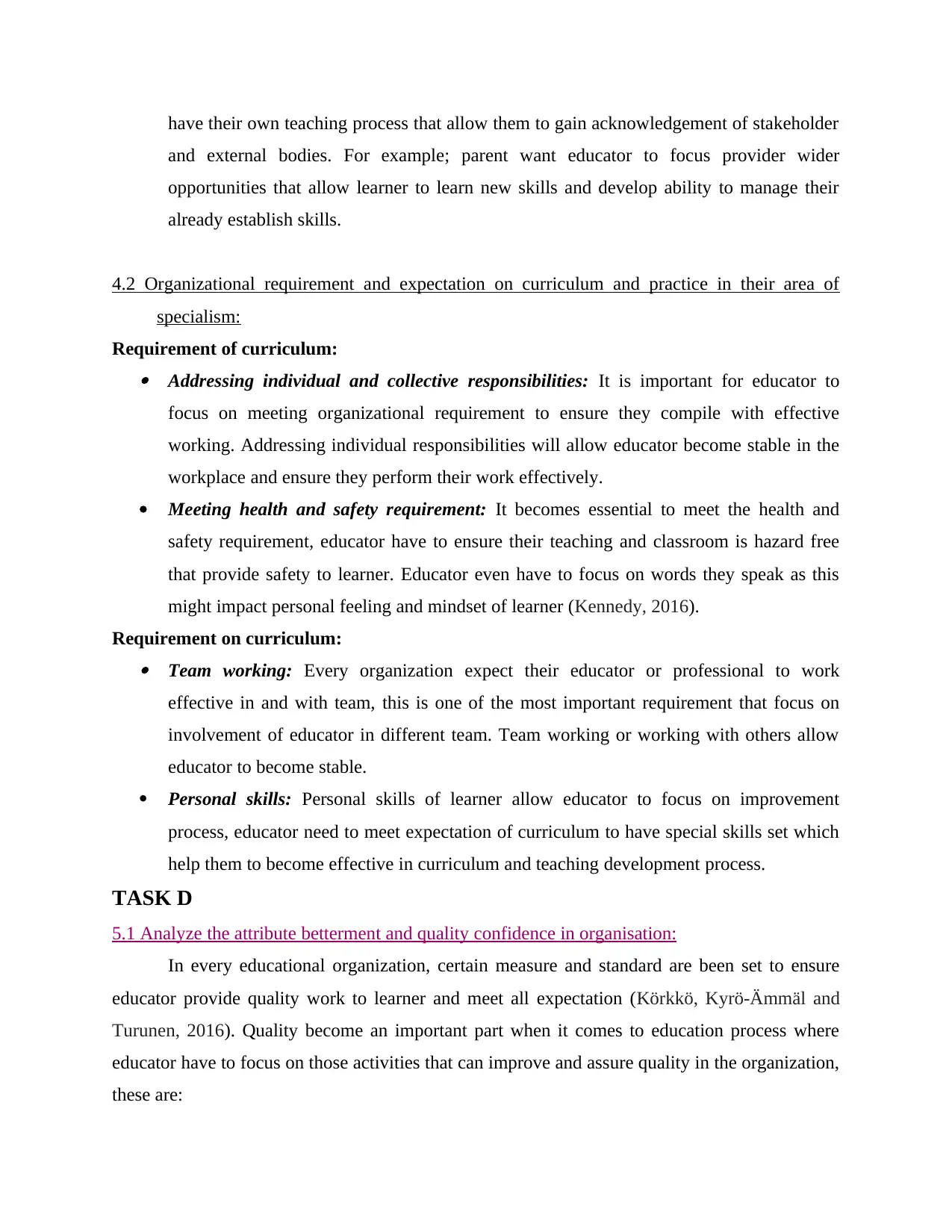
have their own teaching process that allow them to gain acknowledgement of stakeholder
and external bodies. For example; parent want educator to focus provider wider
opportunities that allow learner to learn new skills and develop ability to manage their
already establish skills.
4.2 Organizational requirement and expectation on curriculum and practice in their area of
specialism:
Requirement of curriculum: Addressing individual and collective responsibilities: It is important for educator to
focus on meeting organizational requirement to ensure they compile with effective
working. Addressing individual responsibilities will allow educator become stable in the
workplace and ensure they perform their work effectively.
Meeting health and safety requirement: It becomes essential to meet the health and
safety requirement, educator have to ensure their teaching and classroom is hazard free
that provide safety to learner. Educator even have to focus on words they speak as this
might impact personal feeling and mindset of learner (Kennedy, 2016).
Requirement on curriculum: Team working: Every organization expect their educator or professional to work
effective in and with team, this is one of the most important requirement that focus on
involvement of educator in different team. Team working or working with others allow
educator to become stable.
Personal skills: Personal skills of learner allow educator to focus on improvement
process, educator need to meet expectation of curriculum to have special skills set which
help them to become effective in curriculum and teaching development process.
TASK D
5.1 Analyze the attribute betterment and quality confidence in organisation:
In every educational organization, certain measure and standard are been set to ensure
educator provide quality work to learner and meet all expectation (Körkkö, Kyrö-Ämmäl and
Turunen, 2016). Quality become an important part when it comes to education process where
educator have to focus on those activities that can improve and assure quality in the organization,
these are:
and external bodies. For example; parent want educator to focus provider wider
opportunities that allow learner to learn new skills and develop ability to manage their
already establish skills.
4.2 Organizational requirement and expectation on curriculum and practice in their area of
specialism:
Requirement of curriculum: Addressing individual and collective responsibilities: It is important for educator to
focus on meeting organizational requirement to ensure they compile with effective
working. Addressing individual responsibilities will allow educator become stable in the
workplace and ensure they perform their work effectively.
Meeting health and safety requirement: It becomes essential to meet the health and
safety requirement, educator have to ensure their teaching and classroom is hazard free
that provide safety to learner. Educator even have to focus on words they speak as this
might impact personal feeling and mindset of learner (Kennedy, 2016).
Requirement on curriculum: Team working: Every organization expect their educator or professional to work
effective in and with team, this is one of the most important requirement that focus on
involvement of educator in different team. Team working or working with others allow
educator to become stable.
Personal skills: Personal skills of learner allow educator to focus on improvement
process, educator need to meet expectation of curriculum to have special skills set which
help them to become effective in curriculum and teaching development process.
TASK D
5.1 Analyze the attribute betterment and quality confidence in organisation:
In every educational organization, certain measure and standard are been set to ensure
educator provide quality work to learner and meet all expectation (Körkkö, Kyrö-Ämmäl and
Turunen, 2016). Quality become an important part when it comes to education process where
educator have to focus on those activities that can improve and assure quality in the organization,
these are:
Secure Best Marks with AI Grader
Need help grading? Try our AI Grader for instant feedback on your assignments.
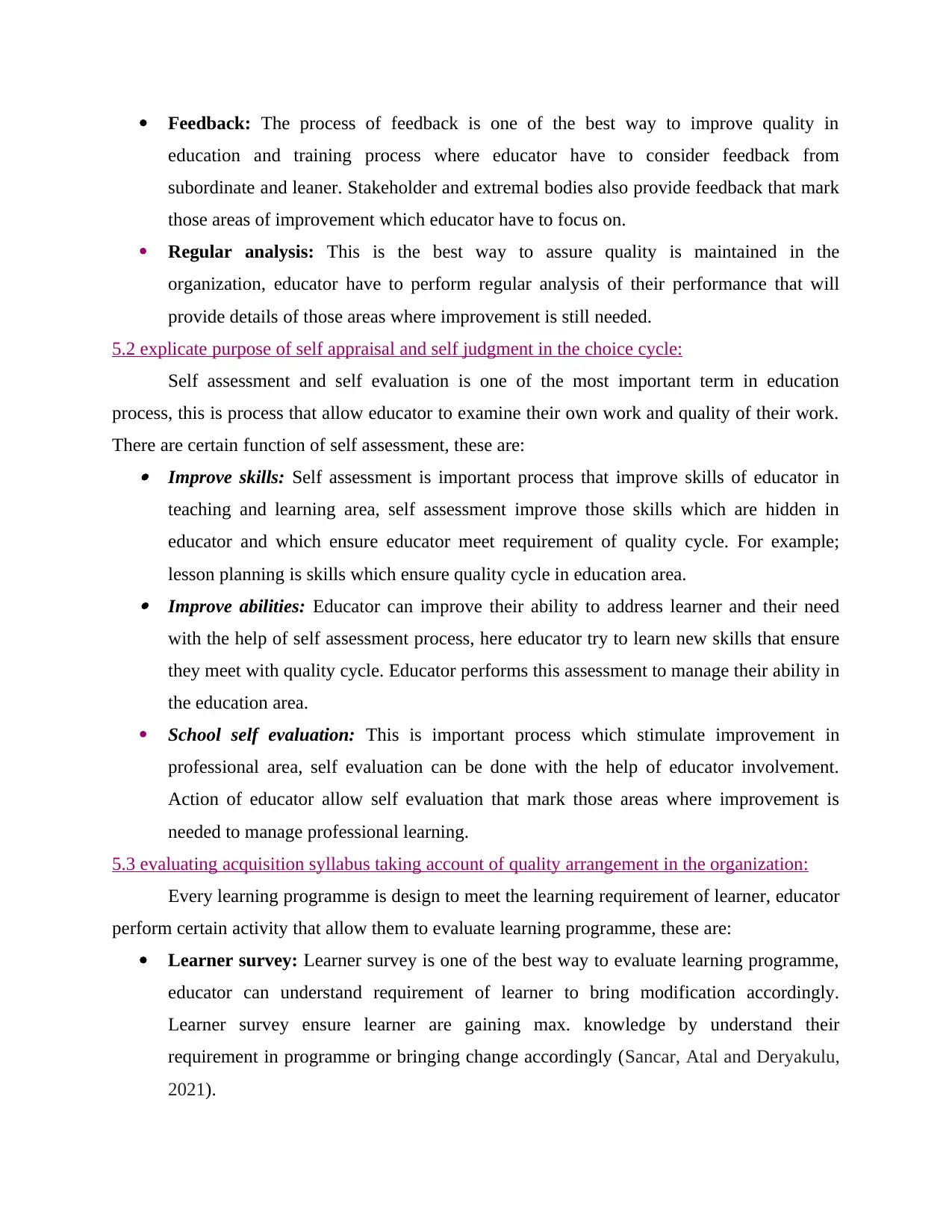
Feedback: The process of feedback is one of the best way to improve quality in
education and training process where educator have to consider feedback from
subordinate and leaner. Stakeholder and extremal bodies also provide feedback that mark
those areas of improvement which educator have to focus on.
Regular analysis: This is the best way to assure quality is maintained in the
organization, educator have to perform regular analysis of their performance that will
provide details of those areas where improvement is still needed.
5.2 explicate purpose of self appraisal and self judgment in the choice cycle:
Self assessment and self evaluation is one of the most important term in education
process, this is process that allow educator to examine their own work and quality of their work.
There are certain function of self assessment, these are: Improve skills: Self assessment is important process that improve skills of educator in
teaching and learning area, self assessment improve those skills which are hidden in
educator and which ensure educator meet requirement of quality cycle. For example;
lesson planning is skills which ensure quality cycle in education area. Improve abilities: Educator can improve their ability to address learner and their need
with the help of self assessment process, here educator try to learn new skills that ensure
they meet with quality cycle. Educator performs this assessment to manage their ability in
the education area.
School self evaluation: This is important process which stimulate improvement in
professional area, self evaluation can be done with the help of educator involvement.
Action of educator allow self evaluation that mark those areas where improvement is
needed to manage professional learning.
5.3 evaluating acquisition syllabus taking account of quality arrangement in the organization:
Every learning programme is design to meet the learning requirement of learner, educator
perform certain activity that allow them to evaluate learning programme, these are:
Learner survey: Learner survey is one of the best way to evaluate learning programme,
educator can understand requirement of learner to bring modification accordingly.
Learner survey ensure learner are gaining max. knowledge by understand their
requirement in programme or bringing change accordingly (Sancar, Atal and Deryakulu,
2021).
education and training process where educator have to consider feedback from
subordinate and leaner. Stakeholder and extremal bodies also provide feedback that mark
those areas of improvement which educator have to focus on.
Regular analysis: This is the best way to assure quality is maintained in the
organization, educator have to perform regular analysis of their performance that will
provide details of those areas where improvement is still needed.
5.2 explicate purpose of self appraisal and self judgment in the choice cycle:
Self assessment and self evaluation is one of the most important term in education
process, this is process that allow educator to examine their own work and quality of their work.
There are certain function of self assessment, these are: Improve skills: Self assessment is important process that improve skills of educator in
teaching and learning area, self assessment improve those skills which are hidden in
educator and which ensure educator meet requirement of quality cycle. For example;
lesson planning is skills which ensure quality cycle in education area. Improve abilities: Educator can improve their ability to address learner and their need
with the help of self assessment process, here educator try to learn new skills that ensure
they meet with quality cycle. Educator performs this assessment to manage their ability in
the education area.
School self evaluation: This is important process which stimulate improvement in
professional area, self evaluation can be done with the help of educator involvement.
Action of educator allow self evaluation that mark those areas where improvement is
needed to manage professional learning.
5.3 evaluating acquisition syllabus taking account of quality arrangement in the organization:
Every learning programme is design to meet the learning requirement of learner, educator
perform certain activity that allow them to evaluate learning programme, these are:
Learner survey: Learner survey is one of the best way to evaluate learning programme,
educator can understand requirement of learner to bring modification accordingly.
Learner survey ensure learner are gaining max. knowledge by understand their
requirement in programme or bringing change accordingly (Sancar, Atal and Deryakulu,
2021).
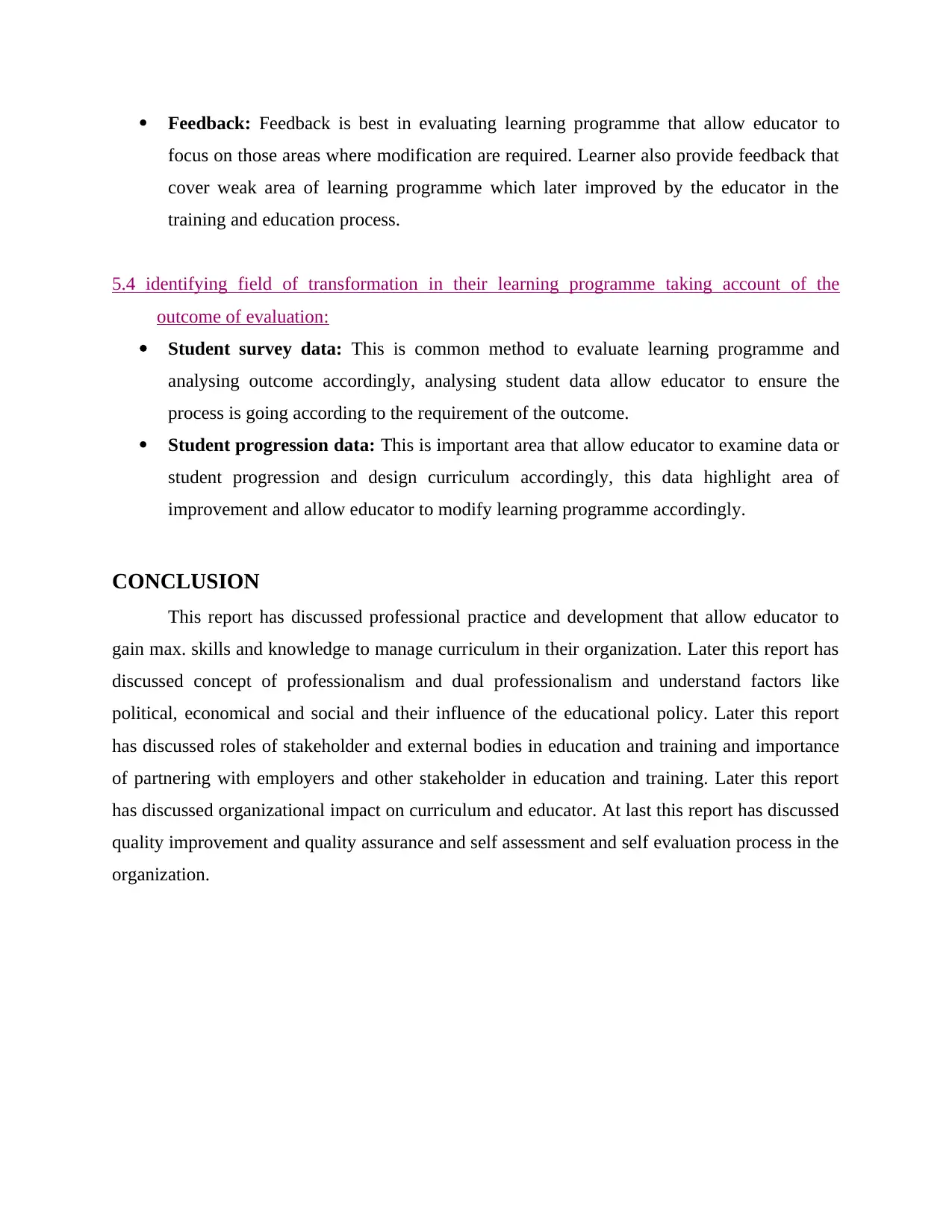
Feedback: Feedback is best in evaluating learning programme that allow educator to
focus on those areas where modification are required. Learner also provide feedback that
cover weak area of learning programme which later improved by the educator in the
training and education process.
5.4 identifying field of transformation in their learning programme taking account of the
outcome of evaluation:
Student survey data: This is common method to evaluate learning programme and
analysing outcome accordingly, analysing student data allow educator to ensure the
process is going according to the requirement of the outcome.
Student progression data: This is important area that allow educator to examine data or
student progression and design curriculum accordingly, this data highlight area of
improvement and allow educator to modify learning programme accordingly.
CONCLUSION
This report has discussed professional practice and development that allow educator to
gain max. skills and knowledge to manage curriculum in their organization. Later this report has
discussed concept of professionalism and dual professionalism and understand factors like
political, economical and social and their influence of the educational policy. Later this report
has discussed roles of stakeholder and external bodies in education and training and importance
of partnering with employers and other stakeholder in education and training. Later this report
has discussed organizational impact on curriculum and educator. At last this report has discussed
quality improvement and quality assurance and self assessment and self evaluation process in the
organization.
focus on those areas where modification are required. Learner also provide feedback that
cover weak area of learning programme which later improved by the educator in the
training and education process.
5.4 identifying field of transformation in their learning programme taking account of the
outcome of evaluation:
Student survey data: This is common method to evaluate learning programme and
analysing outcome accordingly, analysing student data allow educator to ensure the
process is going according to the requirement of the outcome.
Student progression data: This is important area that allow educator to examine data or
student progression and design curriculum accordingly, this data highlight area of
improvement and allow educator to modify learning programme accordingly.
CONCLUSION
This report has discussed professional practice and development that allow educator to
gain max. skills and knowledge to manage curriculum in their organization. Later this report has
discussed concept of professionalism and dual professionalism and understand factors like
political, economical and social and their influence of the educational policy. Later this report
has discussed roles of stakeholder and external bodies in education and training and importance
of partnering with employers and other stakeholder in education and training. Later this report
has discussed organizational impact on curriculum and educator. At last this report has discussed
quality improvement and quality assurance and self assessment and self evaluation process in the
organization.
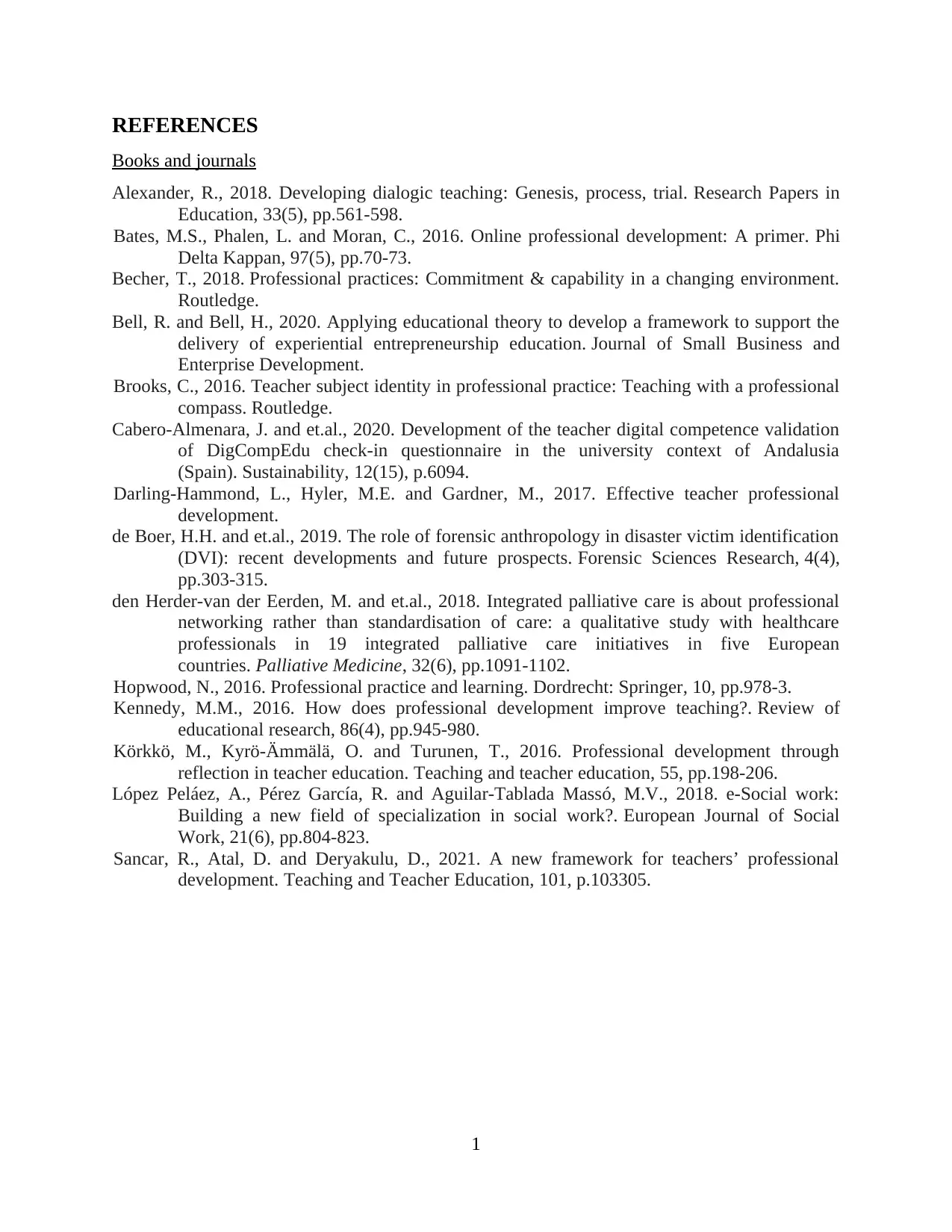
REFERENCES
Books and journals
Alexander, R., 2018. Developing dialogic teaching: Genesis, process, trial. Research Papers in
Education, 33(5), pp.561-598.
Bates, M.S., Phalen, L. and Moran, C., 2016. Online professional development: A primer. Phi
Delta Kappan, 97(5), pp.70-73.
Becher, T., 2018. Professional practices: Commitment & capability in a changing environment.
Routledge.
Bell, R. and Bell, H., 2020. Applying educational theory to develop a framework to support the
delivery of experiential entrepreneurship education. Journal of Small Business and
Enterprise Development.
Brooks, C., 2016. Teacher subject identity in professional practice: Teaching with a professional
compass. Routledge.
Cabero-Almenara, J. and et.al., 2020. Development of the teacher digital competence validation
of DigCompEdu check-in questionnaire in the university context of Andalusia
(Spain). Sustainability, 12(15), p.6094.
Darling-Hammond, L., Hyler, M.E. and Gardner, M., 2017. Effective teacher professional
development.
de Boer, H.H. and et.al., 2019. The role of forensic anthropology in disaster victim identification
(DVI): recent developments and future prospects. Forensic Sciences Research, 4(4),
pp.303-315.
den Herder-van der Eerden, M. and et.al., 2018. Integrated palliative care is about professional
networking rather than standardisation of care: a qualitative study with healthcare
professionals in 19 integrated palliative care initiatives in five European
countries. Palliative Medicine, 32(6), pp.1091-1102.
Hopwood, N., 2016. Professional practice and learning. Dordrecht: Springer, 10, pp.978-3.
Kennedy, M.M., 2016. How does professional development improve teaching?. Review of
educational research, 86(4), pp.945-980.
Körkkö, M., Kyrö-Ämmälä, O. and Turunen, T., 2016. Professional development through
reflection in teacher education. Teaching and teacher education, 55, pp.198-206.
López Peláez, A., Pérez García, R. and Aguilar-Tablada Massó, M.V., 2018. e-Social work:
Building a new field of specialization in social work?. European Journal of Social
Work, 21(6), pp.804-823.
Sancar, R., Atal, D. and Deryakulu, D., 2021. A new framework for teachers’ professional
development. Teaching and Teacher Education, 101, p.103305.
1
Books and journals
Alexander, R., 2018. Developing dialogic teaching: Genesis, process, trial. Research Papers in
Education, 33(5), pp.561-598.
Bates, M.S., Phalen, L. and Moran, C., 2016. Online professional development: A primer. Phi
Delta Kappan, 97(5), pp.70-73.
Becher, T., 2018. Professional practices: Commitment & capability in a changing environment.
Routledge.
Bell, R. and Bell, H., 2020. Applying educational theory to develop a framework to support the
delivery of experiential entrepreneurship education. Journal of Small Business and
Enterprise Development.
Brooks, C., 2016. Teacher subject identity in professional practice: Teaching with a professional
compass. Routledge.
Cabero-Almenara, J. and et.al., 2020. Development of the teacher digital competence validation
of DigCompEdu check-in questionnaire in the university context of Andalusia
(Spain). Sustainability, 12(15), p.6094.
Darling-Hammond, L., Hyler, M.E. and Gardner, M., 2017. Effective teacher professional
development.
de Boer, H.H. and et.al., 2019. The role of forensic anthropology in disaster victim identification
(DVI): recent developments and future prospects. Forensic Sciences Research, 4(4),
pp.303-315.
den Herder-van der Eerden, M. and et.al., 2018. Integrated palliative care is about professional
networking rather than standardisation of care: a qualitative study with healthcare
professionals in 19 integrated palliative care initiatives in five European
countries. Palliative Medicine, 32(6), pp.1091-1102.
Hopwood, N., 2016. Professional practice and learning. Dordrecht: Springer, 10, pp.978-3.
Kennedy, M.M., 2016. How does professional development improve teaching?. Review of
educational research, 86(4), pp.945-980.
Körkkö, M., Kyrö-Ämmälä, O. and Turunen, T., 2016. Professional development through
reflection in teacher education. Teaching and teacher education, 55, pp.198-206.
López Peláez, A., Pérez García, R. and Aguilar-Tablada Massó, M.V., 2018. e-Social work:
Building a new field of specialization in social work?. European Journal of Social
Work, 21(6), pp.804-823.
Sancar, R., Atal, D. and Deryakulu, D., 2021. A new framework for teachers’ professional
development. Teaching and Teacher Education, 101, p.103305.
1
1 out of 13
Related Documents
Your All-in-One AI-Powered Toolkit for Academic Success.
+13062052269
info@desklib.com
Available 24*7 on WhatsApp / Email
![[object Object]](/_next/static/media/star-bottom.7253800d.svg)
Unlock your academic potential
© 2024 | Zucol Services PVT LTD | All rights reserved.



